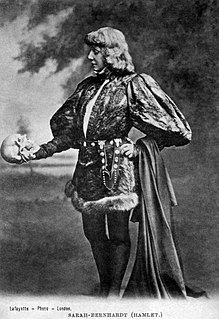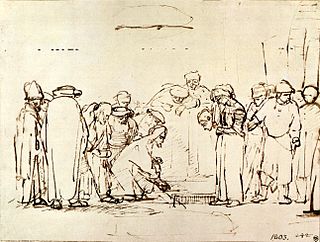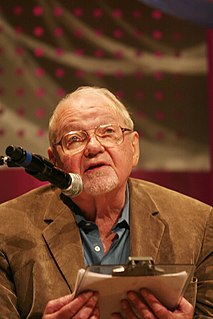'Not / But, or the "not…but" element, is an acting technique that forms part of the Brechtian approach to performance. In its simplest form, fixing the not/but element involves the actor preceding each thought that is expressed by their character in the dialogue or each action performed by their character in the scene with its dialectical opposite. Rather than portraying a thought or action as "naturally" arising from the given circumstances of the scene or "inevitably" following from them, this technique underlines the aspect of decision in the thought or action. "He didn't say 'come in' but 'keep moving'", Brecht offers by way of example; "He was not pleased but amazed":

Acting is an activity in which a story is told by means of its enactment by an actor or actress who adopts a character—in theatre, television, film, radio, or any other medium that makes use of the mimetic mode.

Eugen Berthold Friedrich Brecht, known professionally as Bertolt Brecht, was a German theatre practitioner, playwright, and poet.
Dialectic or dialectics, also known as the dialectical method, is at base a discourse between two or more people holding different points of view about a subject but wishing to establish the truth through reasoned arguments. Dialectic resembles debate, but the concept excludes subjective elements such as emotional appeal and the modern pejorative sense of rhetoric. Dialectic may be contrasted with the didactic method, wherein one side of the conversation teaches the other. Dialectic is alternatively known as minor logic, as opposed to major logic or critique.
They include an expectation which is justified by experience but, in the event, disappointed. One might have thought that ... but one oughtn't to have thought it. There was not just one possibility but two; both are introduced, then the second one is defamiliarized, then the first as well. [1]
This technique is a rehearsal exercise; the verbalizing of the alternative (the "not" of the "not/but") is not necessarily preserved in performance. Its main function is to inscribe traces of the alternatives that were available to the character at each 'nodal point' in their journey within the finished portrait in performance. The effect gives the impression of a "sketching" in the actor's performance, in the sense that with an artist's sketch traces of alternative lines and movements are preserved, overlapping the main defining line rather than being erased. It is this quality that leads Fredric Jameson to contrast Brechtian theatre favourably with what he calls the "well-made production", insofar as its preservation of the actor's process in the final product acts as a form of demystification and de-fetishization, and exploits a potential strength of the medium of theatre:

A sketch is a rapidly executed freehand drawing that is not usually intended as a finished work. A sketch may serve a number of purposes: it might record something that the artist sees, it might record or develop an idea for later use or it might be used as a quick way of graphically demonstrating an image, idea or principle.

Fredric Jameson is an American literary critic and Marxist political theorist. He is best known for his analysis of contemporary cultural trends, particularly his analysis of postmodernity and capitalism. Jameson's best-known books include Postmodernism, or, The Cultural Logic of Late Capitalism (1991) and The Political Unconscious (1981).

In Karl Marx's critique of political economy, commodity fetishism is the perception of the social relationships involved in production not as relationships among people, but as economic relationships among the money and commodities exchanged in market trade. As such, commodity fetishism transforms the subjective, abstract aspects of economic value into objective, real things that people believe have intrinsic value.
The well-made production is one from which the traces of its rehearsals have been removed (just as from the successfully reified commodity the traces of production itself have been made to disappear): Brecht opens up this surface, and allows us to see back down into the alternative gestures and postures of the actors trying out their roles: so it is that aesthetic experimentation generally—which has so often been understood as generating the new and the hitherto unexperienced, the radical innovation—might just as well be grasped as the "experimental" attempt to ward off reification (something the other arts, from novels and films to poetry, painting, and musical performance, even aleatory performance, are structurally and materially less qualified to do). [2]
The result of the technique of fixing the not/but is to shape and clarify the character's behaviour in a particular, interpretative direction (a historical materialist one).

Epic theatre is a theatrical movement arising in the early to mid-20th century from the theories and practice of a number of theatre practitioners who responded to the political climate of the time through the creation of a new political theatre. Epic theatre is not meant to refer to the scale or the scope of the work, but rather to the form that it takes. Epic theatre emphasizes the audience's perspective and reaction to the piece through a variety of techniques that deliberately cause them to individually engage in a different way. The purpose of epic theatre is not to encourage an audience to suspend their disbelief, but rather to force them to see their world as it is.
The distancing effect, more commonly known (earlier) by John Willett's 1964 translation as the alienation effect or as the estrangement effect, is a performing arts concept coined by German playwright Bertolt Brecht (1898–1956).

Yevgeny Bagrationovich Vakhtangov was a Russian-Armenian actor and theatre director who founded the Vakhtangov Theatre. He was a friend and mentor of Michael Chekhov.

Baal was the first full-length play written by the German modernist playwright Bertolt Brecht. It concerns a wastrel youth who becomes involved in several sexual affairs and at least one murder. It was written in 1918, when Brecht was a 20-year-old student at Munich University, in response to the expressionist drama The Loner by the soon-to-become-Nazi dramatist Hanns Johst.
Gestus is an acting technique developed by the German theatre practitioner Bertolt Brecht. It carries the sense of a combination of physical gestures and "gist" or attitude. It is a means by which "an attitude or single aspect of an attitude" is revealed, insofar as it is "expressible in words or actions."

Marxist aesthetics is a theory of aesthetics based on, or derived from, the theories of Karl Marx. It involves a dialectical and materialist, or dialectical materialist, approach to the application of Marxism to the cultural sphere, specifically areas related to taste such as art, beauty, etc. Marxists believe that economic and social conditions, and especially the class relations that derive from them, affect every aspect of an individual's life, from religious beliefs to legal systems to cultural frameworks. From one classic Marxist point of view, the role of art is not only to represent such conditions truthfully, but also to seek to improve them ; however, this is a contentious interpretation of the limited but significant writing by Marx and Engels on art and especially on aesthetics. For instance, Nikolay Chernyshevsky, who greatly influenced the art of the early Soviet Union, followed the secular humanism of Ludwig Feuerbach more than he followed Marx.
A street scene is a basic model for epic theater set forth by Bertolt Brecht. It makes use of a simple, "natural" incident, such as could be seen on any street corner: an eyewitness demonstrating to a collection of people how a traffic accident took place. "The bystanders may not have observed what happened, or they may simply not agree with him, may 'see things a different way'; the point is that the demonstrator acts the behavior of driver or victim both in such a way that the bystanders are able to form an opinion about the incident." This model is set forth as the most primitive type of epic theater to be easily understood by the reader or listener.
Fabel is a critical term and a dramaturgical technique pioneered by the twentieth-century German theatre practitioner Bertolt Brecht.
Non-Aristotelian drama, or the 'epic form' of the drama, is a kind of play whose dramaturgical structure departs from the features of classical tragedy in favour of the features of the epic, as defined in each case by the ancient Greek philosopher Aristotle in his Poetics
The principle of historicisation is a fundamental part of the aesthetic developed by the German modernist theatre practitioner Bertolt Brecht.
Refunctioning is a core strategy of the aesthetic developed by the German modernist theatre practitioner Bertolt Brecht.
The technique of interruption pervades all levels of the stage work of the German modernist theatre practitioner Bertolt Brecht—the dramatic, theatrical and performative. At its most elemental, it is a formal treatment of material that imposes a "freeze", a "framing", or a change of direction of some kind; something that is in progress is halted in some way.
The Messingkauf Dialogues is an incomplete theoretical work by the twentieth-century German theatre practitioner Bertolt Brecht. John Willett translates "Der Messingkauf" as "Buying Brass". According to one Brecht scholar "Brecht worked on [the Messingkauf] primarily during the late 1930s and early 1940s. In Brecht’s words it contains, “a lot of theory in dialog form.”"
"A Short Organum for the Theatre" is a theoretical work by the twentieth-century German theatre practitioner Bertolt Brecht. It was written while in Switzerland in 1948 and published in 1949. In a diary note from the time he refers to it as a "short condensation of the 'Messingkauf'"; when it was re-published in 1953 he identified it as a "description of a theatre of the scientific age"; later still he augmented it with some appendices and linked it to his notes for a "dialectical theatre".

The Baden-Baden Lesson on Consent is a Lehrstück by the German dramatist Bertolt Brecht, written in collaboration with Slatan Dudow and Elisabeth Hauptmann. Under the title Lehrstück it was first performed with music by Paul Hindemith as part of the Baden-Baden festival on 28 July 1929, at the Stadthalle, Baden-Baden, directed by Brecht, designed by Heinz Porep.
Round Heads and Pointed Heads is an epic parable play written by the German dramatist Bertolt Brecht, in collaboration with Margarete Steffin, Emil Burri, Elisabeth Hauptmann, and the composer Hanns Eisler. The play's subtitle is Money Calls to Money and its authors describe it as "a tale of horror." The play is a satirical anti-Nazi parable about a fictitious country called Yahoo in which the rulers maintain their control by setting the people with round heads against those with pointed heads, thereby substituting racial relations for their antagonistic class relations. The play is composed of 11 scenes in prose and blank verse and 13 songs. Unlike another of Brecht's plays from this period, The Mother, Round Heads and Pointed Heads was addressed to a wide audience, Brecht suggested, and took account of "purely entertainment considerations." Brecht's notes on the play, written in 1936, contain the earliest theoretical application of his "defamiliarization" principle to his own "non-Aristotelian" drama.

The Life of Edward II of England, also known as Edward II, is an adaptation by the German modernist playwright Bertolt Brecht of the 16th-century historical tragedy by Marlowe, The Troublesome Reign and Lamentable Death of Edward the Second, King of England, with the Tragical Fall of Proud Mortimer (c.1592). The play is set in England between 1307 and 1326. A prefatory note to the play reads:
Coriolanus is an unfinished German adaptation by the modernist playwright Bertolt Brecht of the English 17th-century tragedy by William Shakespeare. Brecht wrote it sometime between 1951 and 1953. This adaptation reveals the influence of Mao Tse-tung on Brecht's social thought especially the idea of primary and secondary contradictions which Mao discussed in his treatise On Contradiction. Brecht alluded to this text and discusses his development on the original and his ideas for its staging in an essay entitled "Study of the First Scene of Shakespeare's Coriolanus", which is written in the form of a dialogue with his collaborators at the Berliner Ensemble theatre company. The play was first staged by Heinrich Koch at the Frankfurt Schauspielhaus theatre, where it opened on 22 September 1962. It was later staged by the Berliner Ensemble in September 1964. Ruth Berghaus became famous for her staging of the battle scenes in this production. The play was published in an English translation by Ralph Manheim in volume nine of Brecht's Collected Plays.
The Trial of Joan of Arc of Proven, 1431 is an adaptation by the German dramatist Bertolt Brecht of a radio play by Anna Seghers. It was written in collaboration with Benno Besson and premiered at the Berliner Ensemble in November 1952, in a production directed by Besson, with Käthe Reichel as Joan.











